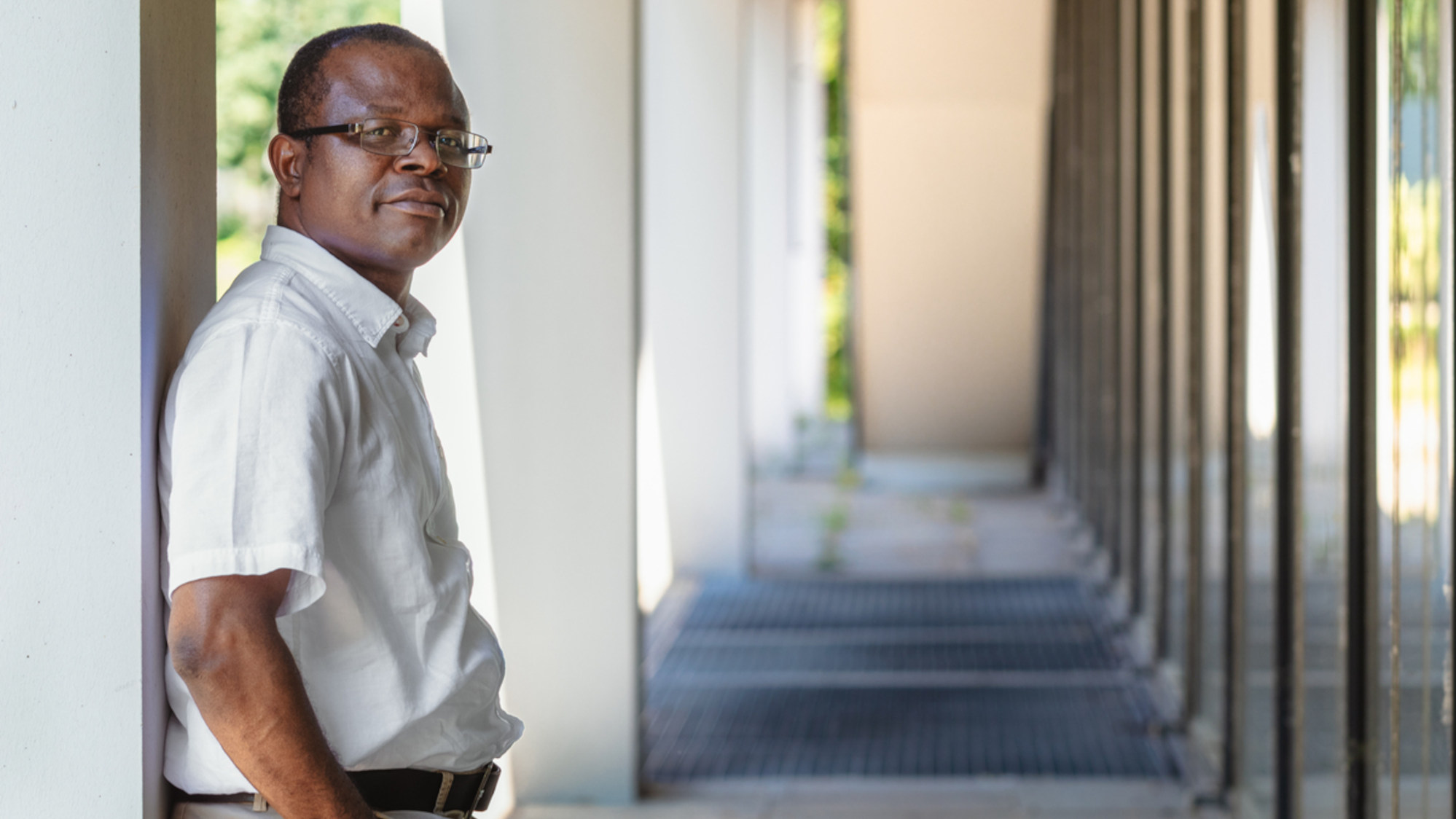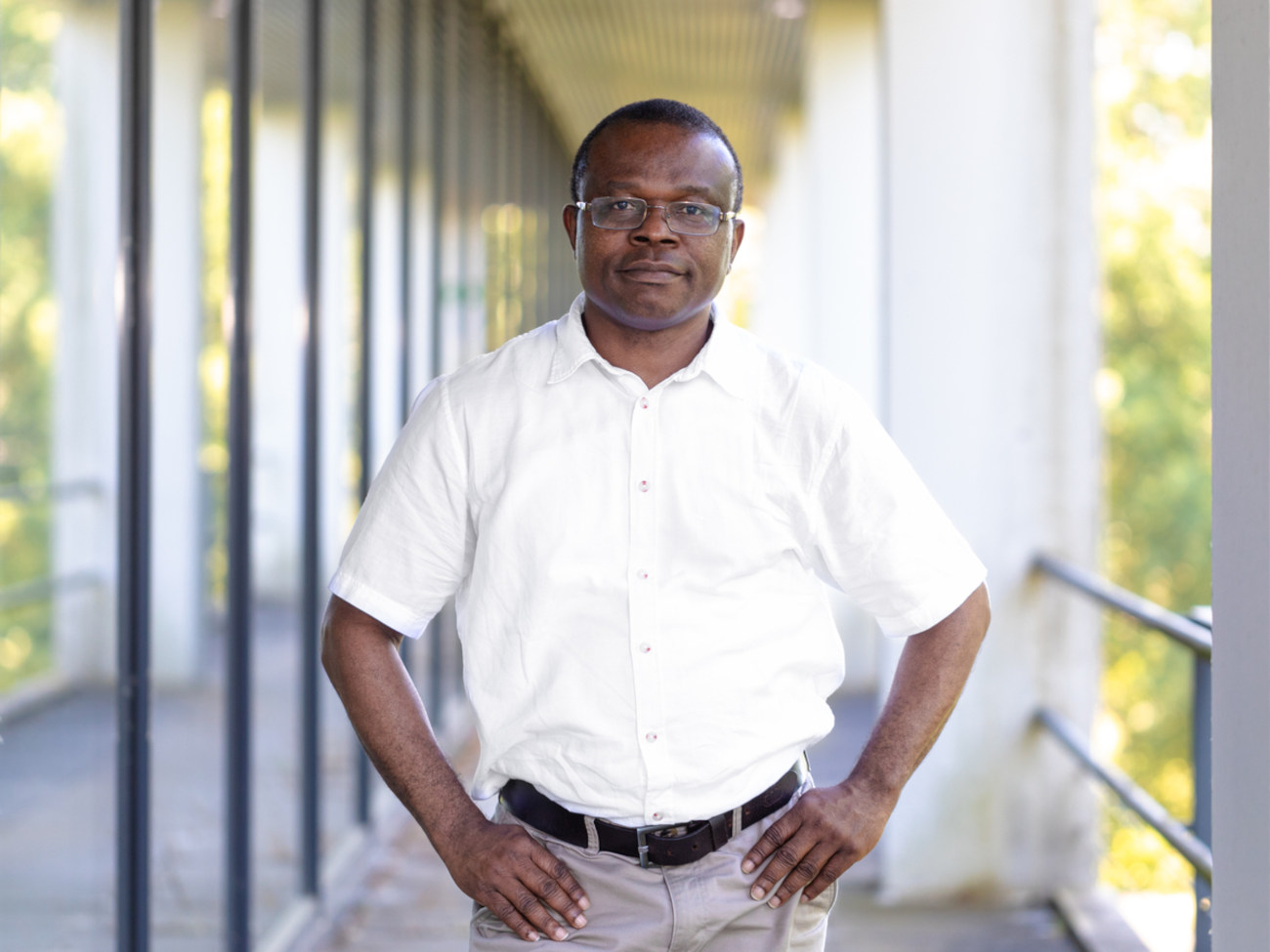
© Matej Meza / Universität Bremen
Digital Help to Combat High Blood Pressure and Obesity
How health scientist Dr. Kufre Okop supports older people in South Africa and Germany
Obesity, high blood pressure, and cardiovascular diseases are now considered common illnesses in Germany. At the same time, digital aids make it easier than ever to do something for your own health. Smartwatches provide an overview of health data including blood pressure and pulse, and online sports classes bring the gym into your own living room. However, older adults, for whom such resources would be particularly helpful, hardly use them. The health scientist Dr. Kufre Okop, who is a Fellow at the Hanse-Wissenschaftskolleg in Delmenhorst, is investigating ways to improve this.
More than 9,500 kilometers lie between Cape Town, where Kufre Okop normally works, and Delmenhorst, where he is staying from December 2023 to August 2024. In many ways, the two cities could not be more different. However, some developments are similar not only in these, but in many places around the world. As digitalization progresses, there is a simultaneous rise in the percentage of the population with excess weight, obesity, and cardiovascular diseases. Both developments disfavor older adults: These conditions are more common with increasing age, and at the same time, many of them are digitally left behind.
Kufre Okop, a health scientist in the Department of Medicine at the University of Cape Town, works at the intersection of these two issues together with Professor Hajo Zeeb, Head of the Prevention and Evaluation Department at the Leibniz Institute for Prevention Research and Epidemiology – BIPS and spokesperson for the Leibniz Science Campus Digital Public Health. Okop is investigating the use of citizen science and other participatory strategies to develop digital health services together with older people. “The goal is to enable them to use digital platforms to prevent chronic diseases and promote health,” he says.
Hanse-Wissenschaftskolleg – Meeting Place for International Researchers
Kufre Okop is one of 15 Fellows from all over the world who currently live and work at the Hanse-Wissenschaftskolleg (HWK). The Hanse-Wissenschaftskolleg is a foundation that aims to promote scientific research and international exchange between researchers. Researchers who have already completed their doctoral thesis can apply here as a Fellow. Fellows at the HWK carry out intensive research on a topic, without any other work obligations, for a period of between three and ten months. Some of them, like Kufre Okop, work together with researchers from the universities of Bremen and Oldenburg. All Fellows receive a scholarship if necessary, and the HWK also provides them with an apartment free of charge. A stroke of luck for Okop, who lives in Delmenhorst with his wife and three children.
Science in Dialogue with Citizens and Social Workers
Data from the Allensbach Institute for market research show what a large group of people Kufre Okop’s research hopes to reach. According to a survey from 2023, about a third of respondents over the age of 60 in Germany never use the internet. Kufre Okop wants to begin discussions with this group. “It is important to me to develop digital services for, and more significantly, with older adults,” he says. Currently, in the first project phase, this means that Okop meets regularly with a small group of about ten people over 55. He would like to know why they seldom or never use the internet, and what health issues they want support with.
Older adult feedback forms the basis for the second project phase, in which Kufre Okop will develop a digital application. “Take, for example, the collection and professional evaluation of health data such as blood pressure and pulse,” he explains. “This measure could help older adults to get an overview of their state of health at home and to make a doctor’s appointment more quickly if this state worsens.” If the target group is open to the idea in general, he will respond to their reservations in a second step. For example, those who shy away from a smartwatch for data protection reasons could instead have the data collected with measuring devices, and transmit these for evaluation by email or in an app.

© Matej Meza / Universität Bremen
The older adults working together with Kufre Okop brought up another topic: hydration. This is important anyway, but is becoming more crucial due to climate change and the associated rising temperatures. The scientist is also working with his group on a digital solution for this topic. Okop uses discussions with other researchers and social workers to supplement the feedback from older people. All this information will flow into the development of a specific mobile application in the third project phase. “We will then test this application with a larger group of people,” he explains. This will be carried out in the BIPS Living Lab – a real-world laboratory in Bremen-Osterholz, where researchers work together with citizens on solutions to challenges in the health sector.
Germany and South Africa: Similar Problems, Different Solutions
Kufre Okop is involved in the discussions with older adults as well as with developing and testing a digital application for them in Germany as well as in South Africa. What is the goal of this? “We want to show that there can be different solutions to similar problems,” he explains. Whether excess weight and obesity become problematic depends in part on cultural and beauty ideals. Also, healthy foods such as fruits and vegetables are not equally available and affordable everywhere. “The different digital solutions that we develop in Germany and South Africa can provide an example for the extent to which digital applications work across cultures and what parts need to be adapted to the specific cultural and social backgrounds,” says the scientist.
The work he started in Delmenhorst will occupy Kufre Okop for some time to come. His project will continue one to two more years after his stay at the HWK. During this time, the scientist will test the digital health solution in other communities in Germany and South Africa. He has established an extensive network with researchers from various fields and disciplines during his stay at the HWK, and collaborates with researchers from BIPS and the Leibniz Science Campus Digital Public Health. This meets another goal of the Hanse-Wissenschaftskolleg – to create connections between researchers that endure beyond their stay.